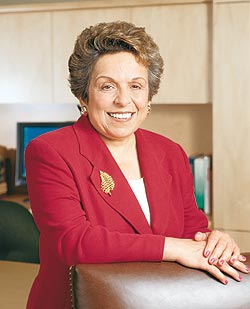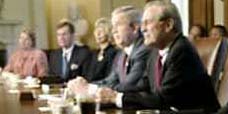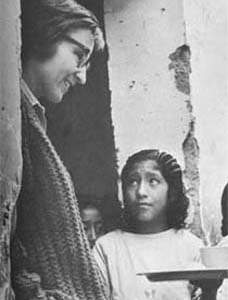February 8, 2005: Headlines: COS - Iran: University Administration: Hurrican Online: Donna E. Shalala recently spoke to the Hurricane's Megha Garg about her experiences in the Peace Corps. Shalala served in Iran from 1962 to 1964.
Peace Corps Online:
Directory:
Iran:
Special Report: Iran RPCV, Cabinet Member, and University President Donna Shalala:
February 9, 2005: Index: PCOL Exclusive: RPCV Donna Shalala (Iran) :
February 8, 2005: Headlines: COS - Iran: University Administration: Hurrican Online: Donna E. Shalala recently spoke to the Hurricane's Megha Garg about her experiences in the Peace Corps. Shalala served in Iran from 1962 to 1964.
Donna E. Shalala recently spoke to the Hurricane's Megha Garg about her experiences in the Peace Corps. Shalala served in Iran from 1962 to 1964.

Donna E. Shalala recently spoke to the Hurricane's Megha Garg about her experiences in the Peace Corps. Shalala served in Iran from 1962 to 1964.
President Shalala talks Peace (Corps) with the Hurricane
Shalala recommends Corps for adventure, learning
By Megha Garg
Published: Tuesday, February 8, 2005
Article Tools:Email This ArticlePrint This Article Page 1 of 1
UM President Donna E. Shalala recently spoke to the Hurricane's Megha Garg about her experiences in the Peace Corps. Shalala served in Iran from 1962 to 1964.
The Hurricane: What motivated you to apply for the Peace Corps?
Donna Shalala: I was tired of school and I wanted an adventure. I was interested in other cultures and I thought I'd learn something about the world, which I did. I went after I finished my undergraduate studies before I went to graduate school. I learned a lot about myself; I learned a lot about the world. I understand now what the poorest places on earth look like and feel like.
TH: Where did you go?
DS: Iran. I lived in a mud village-water and dirt-in southern Iran. They offered me a number of different countries. My family is from Lebanon, so I was happy to be assigned to the Middle East. I taught English and did some development work. I was there for two years.
TH: Were you ever scared? Did you ever think, "What am I doing here?"
DS: I think it's fair to say that everything was a surprise. Living in another culture was another surprise. Living in a mud village was a surprise. But when you are 21 years old, you are fascinated with everything and you have the energy to do that. I wasn't afraid of anything. My parents were always scared for me, but I couldn't describe it as life threatening. I had some people put guns in my face when we passed checkpoints, but can't say that I ever had any great fear.
TH:What kind of person would gain from the Peace Corps?
DS: I think that for students that want to become world citizens there is no better experience. It gives you an experience at a very young age about other cultures, whether you are going on into medicine or law or anything, especially before you go to grad school or move on to your career. You have to have a sense of adventure. You have to be ready to try something new, open to new ideas. Let me put it this way-when I ran a graduate program in Columbia [University] in political science, we accepted almost everyone who was in the Peace Corps. The Peace Corps is for people who really want to see the world from the bottom up.
TH: Any lasting relationships from your experience?
DS: There's a rug in my office from a woman who taught Peace Corps volunteers, and she remembered how much I loved her rug. When she died she had it shipped to me. Every once in a while a former student from Iran calls.
TH: How did the Peace Corps change you as a person?
DS: I think it made me a world citizen, a more international person. It makes me more sensitive to the people around me. It was a fabulous experience. It's still the best professional decision that I ever made. I was better as a Peace Corps volunteer than at any other point in my life. I was a better volunteer than I am a president.
Megha Garg can be contacted at m.garg2@umiami.edu.
When this story was posted in February 2005, this was on the front page of PCOL:
 | The Peace Corps Library
Peace Corps Online is proud to announce that the Peace Corps Library is now available online. With over 27,000 index entries in 430 categories, this is the largest collection of Peace Corps related stories in the world. From Acting to Zucchini, you can use the Main Index to find hundreds of stories about what RPCVs with your same interests or from your Country of Service are doing today. |
 | Bush's FY06 Budget for the Peace Corps
The White House is proposing $345 Million for the Peace Corps for FY06 - a $27.7 Million (8.7%) increase that would allow at least two new posts and maintain the existing number of volunteers at approximately 7,700. Bush's 2002 proposal to double the Peace Corps to 14,000 volunteers appears to have been forgotten. The proposed budget still needs to be approved by Congress. |
 | RPCVs mobilize support for Countries of Service
RPCV Groups mobilize to support their Countries of Service. Over 200 RPCVS have already applied to the Crisis Corps to provide Tsunami Recovery aid, RPCVs have written a letter urging President Bush and Congress to aid Democracy in Ukraine, and RPCVs are writing NBC about a recent episode of the "West Wing" and asking them to get their facts right about Turkey. |
 | Ask Not
As our country prepares for the inauguration of a President, we remember one of the greatest speeches of the 20th century and how his words inspired us. "And so, my fellow Americans: ask not what your country can do for you--ask what you can do for your country. My fellow citizens of the world: ask not what America will do for you, but what together we can do for the freedom of man." |
 | Latest: RPCVs and Peace Corps provide aid
Peace Corps made an appeal last week to all Thailand RPCV's to consider serving again through the Crisis Corps and more than 30 RPCVs have responded so far. RPCVs: Read what an RPCV-led NGO is doing about the crisis an how one RPCV is headed for Sri Lanka to help a nation he grew to love. Question: Is Crisis Corps going to send RPCVs to India, Indonesia and nine other countries that need help? |
 | The World's Broken Promise to our Children
Former Director Carol Bellamy, now head of Unicef, says that the appalling conditions endured today by half the world's children speak to a broken promise. Too many governments are doing worse than neglecting children -- they are making deliberate, informed choices that hurt children. Read her op-ed and Unicef's report on the State of the World's Children 2005. |
Read the stories and leave your comments.

Some postings on Peace Corps Online are provided to the individual members of this group without permission of the copyright owner for the non-profit purposes of criticism, comment, education, scholarship, and research under the "Fair Use" provisions of U.S. Government copyright laws and they may not be distributed further without permission of the copyright owner. Peace Corps Online does not vouch for the accuracy of the content of the postings, which is the sole responsibility of the copyright holder.
Story Source: Hurrican Online
This story has been posted in the following forums: : Headlines; COS - Iran; University Administration
PCOL16921
27
.











